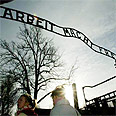
Auschwitz
Photo: AP
A fiery public debate was recently sparked within the media and in the Knesset Education Committee by the publishing of the annual Index of Jewish-Arab Relations in Israel. The index, produced for more than 30 years by Haifa University, will apparently be remembered as the research that “exposed” the widespread phenomenon of Holocaust denial among Israel’s Arab citizens.
But what is behind the dramatic increase (12.5% in two years) in the numbers of Arab respondents – one-third university graduates – who agreed with the statement that “a Holocaust did not take place in which millions of Jews were murdered by the German Nazis”?
Learning about the Holocaust is, after all, a requirement within the Arab educational system in Israel. The subject is a mandatory curricular unit in 10th grade history, and students are tested on it as part of the matriculation exam. Moreover, in recent years there is increasing interest in the Holocaust within Arab schools, which has manifested itself in school projects, exhibits, and trips to Poland as can be seen for example in high schools in Dir al-Assad and Sheikh Danoon. It is therefore safe to assume that Arab graduates of the Israeli educational system are aware, at the very least, that the Holocaust of the Jewish people indeed took place.
Therefore, the obvious conclusion is that the data does not demonstrate a lack of knowledge of the facts, but rather an unwillingness to acknowledge their significance for the Jewish people. Many Arab citizens feel that the Jewish establishment has turned its back on them for the past six decades, ignoring their pain, their suffering and their deepest fears. There is no recognition by the Jewish majority, the argument continues, of the inequality that they have suffered; no room for expression of Arab culture and language; and no legitimacy for the Arab-Palestinian narrative within the State of Israel.
‘We won’t recognize your pain’
Acknowledging the Holocaust is interpreted by some respondents as an act of empathy, of legitimization of the fundamental reason that the State of Israel was established, and indirectly for the suffering of Palestinian society.
On the one hand, not acknowledging the Holocaust is seen as an opportunity to protest against the Jewish majority and to cause hurt, as if to say, “You do not recognize our pain, so we will not recognize yours.” In this sense, it is not only the case that there is no denial of the facts but, on the contrary, recognition of the enormous sensitivity within Jewish society of the memory of the Holocaust which causes a portion of the Arab public to choose to express their frustration in such a callous and destructive fashion.
But Holocaust denial, for whatever rationale, is not only illegitimate but is also immeasurably destructive to the already-fragile relationship between Jews and Arabs in Israel. There is no doubt that it causes genuine pain to the Jewish side, but at the same time there is no underestimating the long term damage it will cause to the Arab minority, which as a whole is paying for the transgressions of a few.
Unfortunately, the deterioration of Jewish-Arab relations has not stopped, and is in fact accelerating. Wars in Lebanon and Gaza, the Azmi Bishara affair, violence in Peqi’in and Akko, and the displays of racism and de-legitimization of Arab citizens in the recent election campaign, compounded by the proposal of the “loyalty bill” – all have combined to reopen old wounds, reminding Arabs that they remain “conditional citizens.” On top of all this came the “Naqba Bill” legislative proposal, which would prohibit commemorating the collective Arab memory of the Palestinian trauma associated with the historical process of the creation of the State of Israel. It is safe to assume that this state of affairs will not diminish the expressions of frustration of Arab citizens – even in regards to “Holocaust denial” – in opinion polling over the coming years.
It is incumbent upon the Jewish majority in Israel to face up to the Arab minority and to acknowledge its inferior status, its hardships and its historical narrative. Such recognition will advance processes of partnership, reconciliation and equality among Israeli Jews and Arabs, which is in the undeniable national interest of the State of Israel.
Amnon Be’eri Sulitzeanu is the Co-Executive Director of the Abraham Fund Initiatives, a non-profit organization that works to advance equality and shared future for Israel's Jewish and Arab citizens















